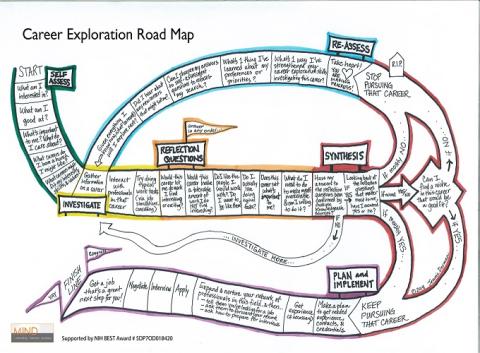For some people “networking” is an intimidating word. They say, “I don’t have any contacts and networking sounds scary.” If you start by thinking about what careers you want to learn about and who you can reach out to who is working in those career areas, the process may feel less intimidating. Calling these interactions informational interviewing can take some of the stress out of learning about career options and developing new contacts.
As a postdoc, I wrestled with the decision not to become a faculty member running a large research group (Principal Investigator, or PI). Truth be told, I had never wanted to be a PI. As an undergrad I saw the job my PI had at a large state school, and it did not entice me. That said, I did think academics might be the way for me, so I went to grad school with a goal to be a faculty member at a small college.
There are many career development theories. A few we have reviewed on this blog have included Super’s Life-Span, Life-Space Theory as well as Krumboltz’s Happenstance Learning Theory. However, today we are going to be reviewing the Chaos Theory of Careers (CTC) as set forth by Pryor and Bright, 2011.

Many PhDs are considering next career steps after the completion of their degree. A big question on many minds is, “Should I do a postdoc or not?” Stephanie Eberle addresses this question in an article on Inside Higher Ed, “Do You Need a Postdoc?”

The career exploration road map is a tool that was developed by Bill Lindstaedt and Jennie Dorman to help students/trainees visualize the career exploration process and track their progress. This tool was initially developed for graduate students and postdocs at the University of California, San Francisco, but is now available for all to use.
Part Two of a Two-Part Series on Transitions *** Before reading this post, take a moment to read Part One - Understanding the Impact of Change*** If you are just arriving at the NIH as a summer student, postbac, graduate student or postdoctoral or clinical fellow, adjusting to your experience at NIH represents a transition that wi
Are you considering a career in medical writing? Intellectual property? Program management? Regulatory Affairs? Science Education and Outreach? And beyond?
There are four groups of skills that all trainees need to have to help ensure success in their careers. These skills are not only beneficial for success if your current role, but are vital skills to continue to develop in order to excel in future career paths. Below are descriptions of these skills sets and a listing of blog posts on each topic. Check out the posts to delve a bit further into each subject area.

